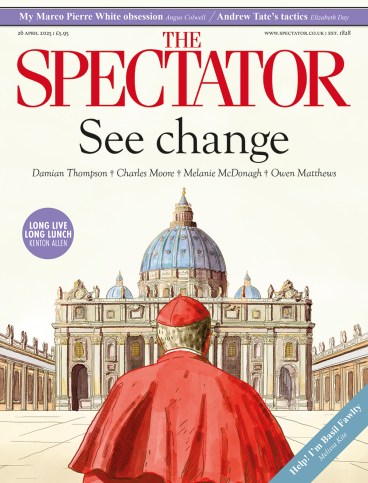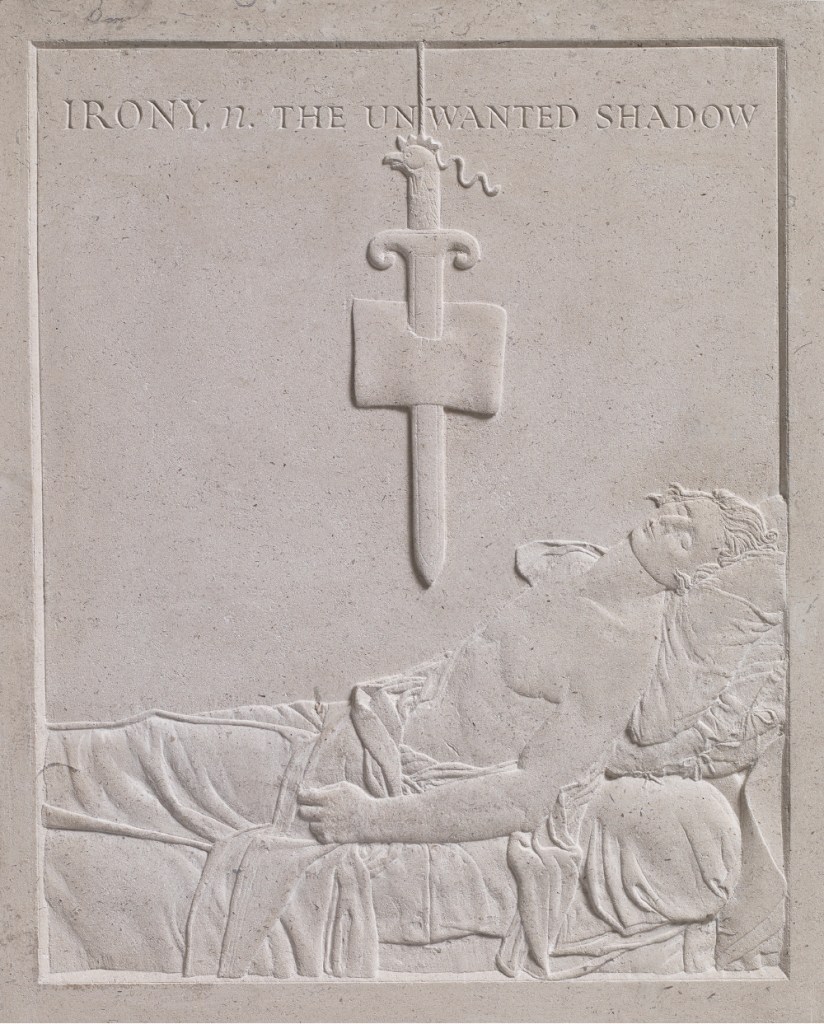
Not many artists engage in the maintenance of a private militia, and it seems fair to assume that those who do may be bound to polarise. The Scottish poet, sculptor, ‘avant-gardener’ and would-be revolutionary Ian Hamilton Finlay was just such a figure: and boy, did he polarise. To his fans, he is a cult figure in the true sense, a limitlessly inventive visionary whose Lanarkshire home and garden remain a site of pilgrimage. To his detractors – notably, a number of vocal Finlay-bashers in the English press – he was a crank, a provincial megalomaniac possessed of artistic, literary and dictatorial pretensions quite out of proportion to his ability. These were opinions you voiced at your peril: anyone who dared ridicule, misrepresent or merely misunderstand Finlay in print ran the risk of being ‘visited’ by his heavies, the so-called ‘Saint-Just Vigilantes’ – ‘a band of impressionable Scots art yobs … sent to terrorise others and defend his honour’, according to the critic Waldemar Januszczak, one of many naysayers who upset the artist. (And yes: he was among those who received a knock on the door.)
It’s not entirely clear whether the self-styled ‘vigilantes’ did anything more menacing than vandalise an office (that of The Spectator’s sister magazine, Apollo, when the late Brian Sewell published a vicious hatchet job in its pages in 1989); nor as to whether the otherwise agoraphobic Finlay himself was interested in anything other than the notoriety such stunts might generate. If so, he might well have shot himself in the practically shod foot: the habitual adjectives ascribed to him whenever his name appears in the press seem to be ‘prickly’, ‘difficult’, and most of all, ‘cantankerous’. Small wonder. Finlay actively cultivated enemies where it suited him and fell out with almost everyone: with his best man, the poet Hugh MacDiarmid, over some perceived slight or other; with the French government, for cancelling a planned commission; and, most famously – we’ll come back to this – the Great Satan that was Strathclyde council.
All of which is to say that it’s perhaps unsurprising his reputation has suffered over the course of the past decade and a half. When he died in 2006, Finlay was acclaimed as one of the greats, commemorated in a big show in Tate Britain’s Duveen Gallery just a few years afterwards. Much has changed since: Finlay has barely merited a mention in our museums since about 2015, and I don’t think it’s totally unreasonable to suggest that the identity politics that have dictated so much of British gallery programming in recent years might have something to do with that. Put differently, prevailing conditions have not been favourable to hyper-localist eccentrics, nor to vocal admirers of Albert Speer’s pipe dreams for the neoclassical rebuilding of Berlin.
All this may be about to change, however. The months to come will witness a long-overdue burst of Finlay-mania: you can already see selections of his work in shows at National Galleries Scotland in Edinburgh and in a smaller but no less wonderful avant-garde poetry display at the Estorick Collection in north London – events soon to be followed by an international outburst of private gallery celebrations in Basel, Brescia, Edinburgh, Hamburg, London, New York, Palma de Mallorca and Vienna. The ostensible occasion is his centenary. Quite improbably for an artist who barely left Scotland in later life, Finlay was born in the Bahamas in 1925, supposedly the son of a bootlegger. But the real prompt, I think, is that he was one of the greatest artists to have emerged from the postwar period, one whose genius transcended his primary medium – poetry – to encompass and conquer any number of others.
Obsessed with classical lore, military aesthetics and, first and foremost, the French Revolution, Finlay created a universe based on carved lettering, fanboy borrowing from sources both textual and visual and some heavy, heavy Doric irony. He emerged from the murk of the postwar poetry scene, a milieu of lofty ambitions and the very lowest of stakes. Vicious feuds between the movement’s leading lights played out in dingy pubs, or in the pages of ‘little’ magazines, seldom interesting anyone beyond the bitching parties; nobody ever made any money. And this was in London: just imagine what it must have been like in the dingy saloons of 1950s Edinburgh, let alone the Orkney Islands, to which Finlay exiled himself for some years. Yet for all that he distanced himself from the metropole, his horizons stretched far beyond the incestuous British literary demi-monde. Among his touchstones were the Italian Futurist poets and Guillaume Apollinaire, who, in very different ways, had twisted the layout of text to evoke the imagery it conjured: for instance, ‘Il Pleut’, the latter’s inspired ode to a downpour, laid out as a cascading torrent of type. Broadly speaking, this is what we now call ‘concrete poetry’.
Finlay was an enthusiastic proponent of this form and his own paper publications, put together by his Wild Hawthorn Press imprint, are beautiful things, bearing witness to his spiky sense of humour and seemingly endless capacity to create graphic puns from any source he chose: a technical diagram of a modern Royal Navy frigate, for example, might be copied and repurposed as his own personal ode to a Grecian temple; in his telling, its radar domes and gun turrets are explained away as examples of classical architectural styles. But his real innovation was to take this inventive formula off the page and put it into a form that was, well, concrete. Onomatopoeic or punning poems, often consisting of just a few words, sometimes in demotic Scots, were carved into stone or cast in bronze, disciplines that required the talents of skilled craftsmen whose fidelity Finlay cultivated with significantly more diligence than he did the attentions of the national press.
To his fans, Finlay is a cult figure in the true sense, a limitlessly inventive visionary
Sometimes, the visual joke was all that he needed. Finlay specialised in juxtaposing the poetic sublime with blunt evocations of militaria. The gates to his home at Stonypath are adorned with finials in the shape of hand grenades, riffing on the pineapple forms that so often fulfilled this decorative function. Often, he was more provocative still: one postcard he created in 1987 pairs Coleridge’s observation that nature was ‘the Devil in a fancy waistcoat’, with Finlay’s own, contemporary metaphor: to wit, ’a stormtrooper in a camouflage smock’. They are sandwiched between borders of blocky green jigsaw pattern that could well suit either image.
His most celebrated work is almost certainly ‘Little Sparta’, the garden-cum-city state he and his wife Sue created at their home in Stonypath from 1966. Named in response to nearby Edinburgh’s claims to be ‘the Athens of the north’, it is a Lowlands parallel universe of engravings, faux-Grecian sculpture, carefully selected vegetation and miniature tank traps. These last were symbolic remnants of his long-running war against the aforementioned Strathclyde council: faced with a rates bill he was unwilling or unable to pay in 1983, he claimed – perhaps not unreasonably, but who knows? – that a temple to Apollo he had built on its grounds was a religious, rather than a commercial, structure. The taxman disagreed, and when the collectors were sent in, Finlay once again unleashed his ‘vigilantes’ – and, we know not how, he seems to have won.

He later mythologised the event as ‘The First Battle of Little Sparta’, commemorating it with a series of Soviet-style stamps, prints and a sculptural monument on the site of combat: a bronze plaque bearing an inscription from Virgil’s Eclogues (‘Flute, begin with me Arcadian notes’) above the image of a second world war American machine gun. Like Irn-Bru, the humour may not be to all tastes, but it was distinctly Scottish. It is also very much grounded in Finlay’s particular circumstances: he was old enough to have had a proper classical education and served in the Royal Army Service Corps in the war – and was well into middle age by the time he really found his artistic voice, too elitist for pop art (a term he appears to have despised) and too old for the more voguish currents of 1960s avant-garde poetry.
Finlay actively cultivated enemies where it suited him and fell out with almost everyone
If you’ve got the sense that all this amounts to a pro forma argument for Why Ian Hamilton Finlay Matters Now, I’m not even sure that he does. Why should he? His work continues to surprise, amuse, move and fascinate, a testament to the idea that art can change your life in spite of being totally irrelevant beyond the confines of its creator’s bizarre personal mythology; and whether it was a question of beauty and truth, or one of beauty and artfully constructed falsehood, he delivered, always. I don’t know where this leaves me as someone reviewing his work, but: if Finlay’s vigilantes are still out there, and they do turn up to break my fingers – would someone please call an ambulance?
National Galleries of Scotland, Edinburgh, until 26 May. Ian Hamilton Finlay: Fragments is at the Victoria Miro Gallery, London, from 30 April until 24 May and at Ingleby, Edinburgh, from 3 May until 14 June. Breaking Lines is at the Estorick Collection until 11 May.








Comments